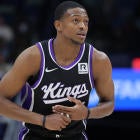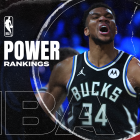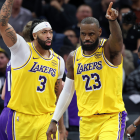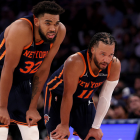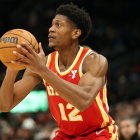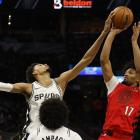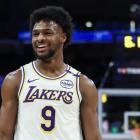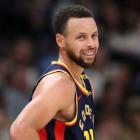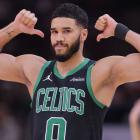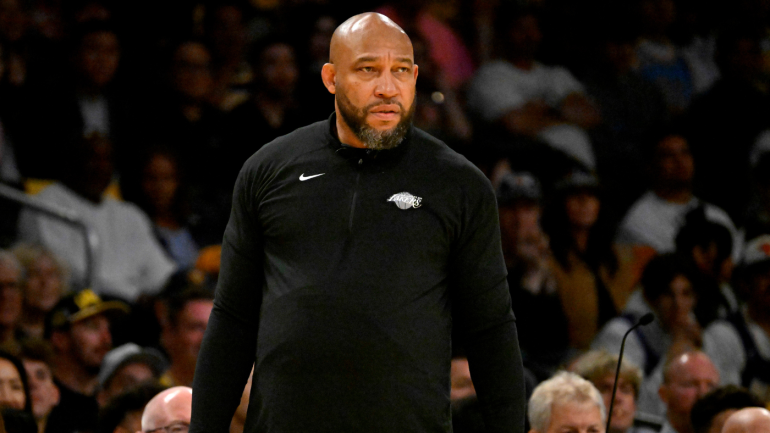
With 57.1 seconds remaining in Game 2 of the Los Angeles Lakers' first-round loss to the Denver Nuggets, LeBron James was called for a critical foul on a Jamal Murray miss that sent the young star guard to the free-throw line with a chance to tie the game. The contact certainly appeared marginal on first viewing, and though the Last Two Minute report would later confirm that it was indeed a foul, there would have been hardly any downside to challenging the call. The Lakers had two timeouts left, and even if they had lost the challenge, the time it would have taken for the officials to review the play would have given an exhausted, older Lakers team playing at altitude some badly-needed rest.
Darvin Ham, having already overseen the loss of a 20-point second-half lead with minimal adjustments, did nothing. Murray sank the free throws. Denver won at the buzzer. A golden opportunity to seize home-court advantage against an opponent that had so thoroughly dominated the Lakers during his coaching tenure slipped through his fingers. Despite leading for much of the series, the Lakers ultimately fell to the reigning champs in Game 5, 108-106, losing the series 4-1.
The moment was, in many ways, a microcosm of Ham's second year coaching the Lakers. This was a season bathed in "what if's." Almost every supporting player dealt with injuries at some point. The front office supplied Ham with no reliable two-way players aside from the two cornerstones, James and Anthony Davis. The In-Season Tournament seemed to sap the team of energy for a month.
Truthfully, the roster might have been too flawed to ever seriously compete for a championship. If nothing else, it's hard to imagine any world in which this collection of players could ever beat the Nuggets in a seven-game series regardless of who was coaching them. But Ham didn't exactly help matters with his rejection of what so often felt like common sense solutions to this team's problems. Now, according to reports from both Shams Charania, Jovan Buha and Sam Amick of The Athletic and Dave McMenamin of ESPN, Ham's job is in serious jeopardy. It was those basic failures that led him to this point.
On a macro level, it was his rejection of what worked on the way to last year's Western Conference Finals that doomed the early season. Rui Hachimura was probably the fourth-best Laker during that 2023 playoffs run. When the front office re-signed him to an expensive three-year deal, it was under the assumption that he would hold a significant role in his first full season with the team. Sure enough, with Jarred Vanderbilt injured, a starting spot at forward was seemingly available.
Hachimura played less than 15 minutes on opening night. Ham chose free-agent signee Taurean Prince, a player he briefly crossed over with in Atlanta, for the starting role. Ham's affection for players he coached before arriving in Los Angeles was a sticking point for at least one other player.
When D'Angelo Russell struggled to gain a footing in Los Angeles, he felt the presence of Dennis Schroder, another former Hawk from Ham's Atlanta days, was a reason why. "His relationship with Darvin is the reason I couldn't have a relationship with Darvin," he told McMenamin in a March profile.
Prince was miscast as a starter, and that became a running point of frustration for Laker fans. They won their first 13 games in which Prince played fewer than 25 minutes and ultimately finished the season 28-8 under such circumstances. Yet Prince held onto his starting position even upon Vanderbilt's return. With him back in the fold, the Lakers had all of the necessary components for their best unit.
The James-Davis-Russell-Vanderbilt-Austin Reaves fivesome, which started down the stretch and into the playoffs last season, outscored opponents by 37 points in 77 regular-season minutes and nine in 177 playoff minutes. The sample was small, but the fit was basic. Vanderbilt could pick up tough defensive assignments so Reaves and Russell wouldn't have to. Russell and Reaves provided enough supplementary shooting and playmaking to cover for Vanderbilt offensively.
That lineup played only 32 total minutes together during the 2023-24 season without ever starting a single game. It still had the second-highest plus-minus of any Laker lineup on the season at +27. Which lineup finished No. 1? The four opening night starters... with Hachimura. Ham didn't start that group together until Feb. 1. It went 18-6 down the stretch.
You can find smaller-scale but thematically similar mistakes across any number of individual games. A December loss to the Mavericks, for instance, was decided on Ham's utter refusal to guard Dante Exum. The journeyman wing attempted nine 3-pointers in that game. He didn't take more than five in any other game this season. Yet eight of those shots were considered wide-open by NBA.com tracking data. He made seven. Dallas won by two.
Losses like that wore on the team, and so did the lineup changes that followed them. In January, The Athletic reported that there was "a deepening disconnect between Ham and the Lakers locker room." James has, at least on one occasion, admitted to overruling his coach on a strategic matter.
"We had switching built in vs. Kawhi and versus James [Harden] and whatever the case may be and I vetoed it in the second half," he said after a key March win over the Clippers on Mind the Game, his podcast with JJ Redick. James did indeed guard Leonard down the stretch. Davis did not name his coaches directly, but seemingly made a subtle jab at them after Game 2 when he said "we have stretches where we don't know what we're doing on both ends of the floor." Ham felt the need to defend his coaching staff after that defeat, in direct response to what Davis said.
The series-ending Game 5 loss to the Nuggets put a somewhat damning exclamation point on Ham's failures in his second season. Late in the third quarter, Ham allowed Denver to go on a 14-2 run that turned a nine-point lead into a three-point deficit without calling a timeout at any point in between. It was the sort of run Denver has been going on all series. Ham, again, watched it unfold.
He somehow managed to find himself on the other end of the timeout management spectrum in the fourth quarter. This time, he elected to voluntarily sacrifice his final timeout to challenge a foul call against Davis. The challenge succeeded, but it left the Lakers with no timeouts for the final 3:04 of the game because it was their second challenge of the game. Murray's game-winner sank with four seconds remaining. The best shot the Lakers could muster in response without a timeout to advance the ball was a 40-foot Prince heave.
Murray's winner was a reflection of the bad habits that Ham has allowed to creep in all season. Denver's play-call was an empty-side pick-and-roll. Murray and Nikola Jokic were on one side of the court. Denver's three remaining players were all bunched together on the other side.
The logical defensive answer to this play-call would have been for one of those weakside defenders to offer help at the nail as the shot-clock expired, as the Lakers were more than covered at the rim with James as the low-man and in the corner and wing with Prince there. Hachimura would have been the obvious helper. Prince saw what was happening and attempted to shove Hachimura into the play. But Hachimura stood and watched Murray's jumper fall.
JAMAL MURRAY FOR THE WIN. AGAIN. pic.twitter.com/pBzHetyt8e
— Steve Jones Jr. (@stevejones20) April 30, 2024
None of this is meant to deny the difficulty of the job Ham was tasked with performing. James has had eight head coaches across 21 NBA seasons. He's a demanding player, and his very presence invites pressure. The roster Rob Pelinka constructed was enormously flawed. Most of the players it included were highly specialized to either offense or defense. A desperate attempt to achieve balance informed so many of Ham's early-season lineup decisions before he finally just embraced the all-offense nature of his roster.
Scouting is typically a strength for this front office. The decision to use the No. 17 overall pick to select Jalen Hood-Schifino, a project point guard for a roster not exactly lacking in ball-handling, was puzzling in the moment. Now, 10 months later, it looks like a borderline disaster. The next three picks were Jaime Jaquez Jr., Brandin Podziemski and Cam Whitmore. All three are All-Rookie candidates at positions of greater need. Pelinka didn't put Ham in a position to succeed.
And that's one of the biggest reasons Ham may return for a third season. There's a human element to these decisions that tends to supersede the best interests of the team. The stakeholders who would have to decide to fire Ham are also the ones who hired him. You only get so many coaching changes as a front office before ownership starts wondering what you're up to. The Russell Westbrook trade was suggested by James and executed by Pelinka. They both survived Westbrook's Lakers tenure. Former head coach Frank Vogel did not. It becomes a lot harder to pin that deal's failure on Vogel when the results remain disappointing after he's gone.
There's plenty of blame to go around this season, and there's even more that needs to be fixed going into the next one. This is not a championship-caliber roster. But the year they just had indicates that they likely don't have a championship-caliber coach either. Maybe Ham could grow into one.
"Maybes" aren't good enough when James is about to enter his age-40 season. Fixing the roster is a delicate process that the Lakers have limited control over. They can't force another team to trade them the right players. But a a coaching change is within their own power. If Ham has another season like this one, the Lakers won't be competing for anything next spring. A coaching upgrade wouldn't fix everything wrong with this team, but it would hopefully at least address the sort of basic mistakes that held the Lakers back all season. That may not be enough to make them champions again, but it would be better than the first-round exit they just endured.









